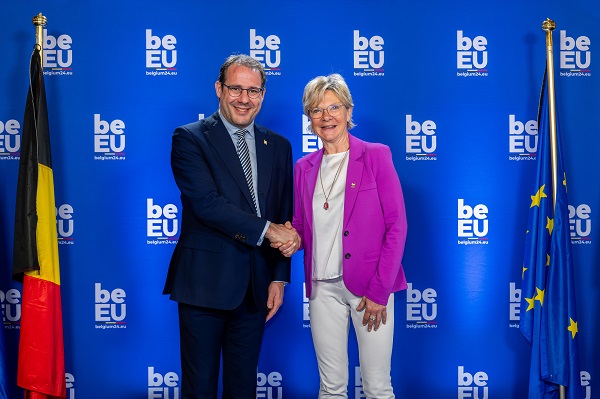 (L-R) David Clarinval, Belgium's Minister for Small Businesses, Self-Employed, SMEs and Agriculture, Institutional Reform and Democratic Renewal; Martine Hansen, Luxembourg's Minister for Agriculture, Food and Viticulture;
Credit: © Belgian Presidency of the Council of the European Union / Julien Nizet
(L-R) David Clarinval, Belgium's Minister for Small Businesses, Self-Employed, SMEs and Agriculture, Institutional Reform and Democratic Renewal; Martine Hansen, Luxembourg's Minister for Agriculture, Food and Viticulture;
Credit: © Belgian Presidency of the Council of the European Union / Julien Nizet
Luxembourg's Ministry of Agriculture, Food and Viticulture has reported that Minister Martine Hansen participated in the informal meeting of European Union Agriculture Ministers in Genk, Belgium on Monday 8 and Tuesday 9 April 2024.
Meeting under the Belgian Presidency of the Council of the EU, the agriculture ministers assessed possible measures to make the EU less dependent on protein imports and to increase the production of plant protein in particular.
During the discussions, Luxembourg's Minister for Agriculture, Food and Viticulture noted that the deficit in plant protein production affects both human and animal food. She stated: "We must increase European production of plant protein, whether from protein and oilseed crops or from pastures, in particular in order to reduce the use of imported soya, but in my view it is also essential to continue to produce animal protein − meat and milk − for human food. Basically, we must promote our pastures through sustainable and circular breeding of ruminants which is part of the European agricultural model, and which is anchored in the DNA of Luxembourg agriculture!"
As reported by Luxembourg's Agriculture Ministry, the deficit in the cultivation of protein and oilseeds in Europe results essentially from the lack of competitiveness compared to cereals. To overcome this, Minister Hansen proposed several solutions to the Council, namely coupled aid within the framework of the Common Agricultural Policy (CAP) and more substantial investment aid for the protein and oilseed sectors. She also highlighted the potential of new technologies as well as the essential role of research. She suggested carrying out a study at EU level in order to quantify the different possibilities for protein production.









